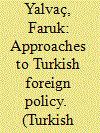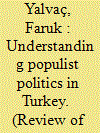| Srl | Item |
| 1 |
ID:
129563


|
|
|
|
|
| Publication |
2014.
|
| Summary/Abstract |
This article analyses different approaches to Turkish foreign policy (TFP) from a critical realist perspective. It seeks to criticize positivist and post-positivist approaches to TFP, arguing for a non-reductionist, historical materialist approach based on the principles of critical realism. It argues that historical materialist approaches are missing both from the analysis of TFP and from the mainstream foreign-policy analysis in general. In emphasizing the importance of a historical materialist approach, the paper also underlines the importance of acknowledging the structural context of foreign policy-making as a complement to the agent-centric, micro-level analyses that dominate the mainstream TFP analysis. Finally, it advocates a research agenda that focuses on the development of a historical materialist approach to TFP.
|
|
|
|
|
|
|
|
|
|
|
|
|
|
|
|
| 2 |
ID:
168876


|
|
|
|
|
| Summary/Abstract |
The aim of this article is to understand populism as a hegemonic project involving a struggle for power between different social forces. We take a critical realist approach in defining populism. This implies several things. We develop a new approach to understanding populist politics by taking neither a purely discursive (Laclau), nor a solely structural (Poulantzas), but a critical realist approach and analysing the three-way relationship between structural conditions, agency, and institutional framework. Second, it implies that populist politics is composed of complex and often contradictory dynamics and emergent features involving mainly domestic but also international processes. We develop this through a combination of three concepts – passive revolution, hegemonic depth, and partial hegemony. These indicate how a hegemonic project is situated in deeper social relations and how hegemonic leadership responds to this. We take the policies of AKP government in Turkey as a case in populist hegemonic project. We demonstrate that AKP has followed different hegemonic projects during its rule changing from an initial majoritarian populist politics to one of neoliberal authoritarian populism as it has consolidated its hegemonic depth. These different populist projects involve alternative visions of Turkey but are nevertheless all compatible with a global neoliberal agenda.
|
|
|
|
|
|
|
|
|
|
|
|
|
|
|
|